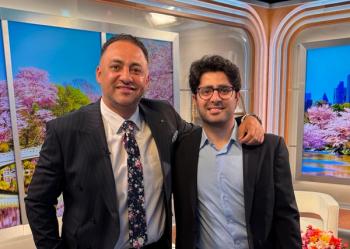
Graduating Residency: Think and Thank (Part 1)
Medical residency inspires and trains the physician, mentally, emotionally, and intellectually. The experiences of internship, Grand Rounds, rotation, and more--these can turn an apprentice into a master.
In 1884, a “Home for Chronic Invalids” was founded in the Bronx and named after then still-living 100-year-old Jewish philanthropist Sir Moses Montefiore. This institution, which cared for patients so infirm that other hospitals refused to admit them, eventually grew into Montefiore Medical Center, where I am a resident. Just as the home for invalids cared for those neglected by society then, the medical center continues to deliver health care to residents of many of the poorest zip codes in the United States.
As a psychiatry resident here, I feel a special connection with the namesake of our institution that goes beyond his vision for helping those in great need and whom society has largely ignored. When Sir Moses was knighted by Queen Victoria in 1837, he chose the motto “Think and Thank” to be part of his Coat of Arms. This great man decided that half of his motto, words that would be forever joined to his legacy, should be spent on the subject of the psyche.
As I have spent my residency doing quite a bit of thinking about and with my patients, and now I am on the doorstep of graduation, it is time for me to heed the advice of the other half of his motto, to thank. There are many people who deserve thanks for making these past 3 years of training the most intellectually stimulating, emotionally challenging, and unquestionably wonderful years of my life. As I set out to thank many people and to articulate their lessons for which I am most appreciative, I realize, of course, that it will be only after many years of practice that the importance of particular lessons will come into consciousness.
Consultation-Liaison psychiatrist, Maria Gomez, MD, was the first attending to whom I ever presented a patient at Montefiore. After having spent my intern year at another hospital where I felt my confidence sink to new lows each time I presented, I was very nervous. Knowledge of Dr Gomez’s reputation as incredibly knowledgeable across many fields of medicine only further sent my nerves on edge. Within 3 minutes of starting my first patient presentation on July 1, 2009, Dr Gomez turned to the CL Fellow rounding with us and said, “This guy is good.” Although I cannot recall with much accuracy the minutes following this comment, I believe that my presentation most likely took a nosedive while I processed what it felt like to receive positive feedback.
With that one comment, Dr Gomez showed the power of even just a few words if the source of those words is held in high regard. For the remainder of my rotation on Consultation Liaison, I was able not only to absorb the comments from Dr Gomez, which boosted my self-confidence, but also to listen more carefully to the critiquing of my work. I could engage in her Socratic questioning with the knowledge that the conversation would end with her teaching me something new without feeling that my lack of this knowledge made me anything less than I was, an apprentice being taught by a master.
With a Masters in Russian history, mother, grandmother, marathon runner, voracious reader, Red Sox fan, Chief of Consultation-Liaison Psychiatry, Mary Alice O’Dowd, MD, may be the single most interesting person I have ever met. Although her work as an attending and my many conversations with her have aided my formal and informal education in countless ways, a key learning event in my relationship with Dr O’Dowd was in her role as head of Grand Rounds in the department. As a PGY2, I asked Dr O’Dowd if I could organize a Grand Rounds about country music because the more I listened to that genre of music, the deeper my appreciation was for the ability of great country songs to communicate the lows and highs of the human emotional experience. She responded with an enthusiastic, “Sure, why not?”
When I invited songwriter and Oscar Nominee Bob DiPiero, writer of 15 Billboard Country #1 Hits, to come and speak about his writing process, Dr O’Dowd did not hesitate to fly him up from Nashville.
Through this experience, I was simultaneously impressed by and fearful of the level of responsibility I was given. If the Grand Rounds were not a success, would this be a permanent stain on my reputation? I secretly feared that I would be handed a one-way plane ticket and invited to join Mr DiPiero on his flight back to Nashville.
Why was planning these Grand Rounds with the permission and blessing of Dr O’Dowd so educational? Dr O’Dowd is beloved in the department and part of that is the fullness of the human experience she wishes to be considered during the series of Grand Rounds. She has rightly concluded that if it contributes to our understanding of the human condition, whether on the molecular, cellular, cerebral, or emotional level, it is rightly considered apropos to our work. Fortunately, when the Grand Rounds ended with loud applause, I knew that things had gone well and there would be no permanent damage to my career. Rather, it was likely this experience that gave me the confidence to present at Grand Rounds a year later.
Dr O’Dowd provided me a controlled environment for risk. Despite my secret fears, she knew that nothing terrible would happen if the Grand Rounds were an abject failure.
One of these attendings gave me the necessary feedback and the other the necessary opportunity to be able to buffet the tremendous amount of learning that one must achieve during residency. A great deal of this learning comes by way of more senior psychiatrists pointing out how they would have handled a situation better. Without teachers such as Drs Gomez and O’Dowd, the process of learning can become disheartening and destructive, with them, gratifying and productive. Thank You.
Newsletter
Receive trusted psychiatric news, expert analysis, and clinical insights — subscribe today to support your practice and your patients.







